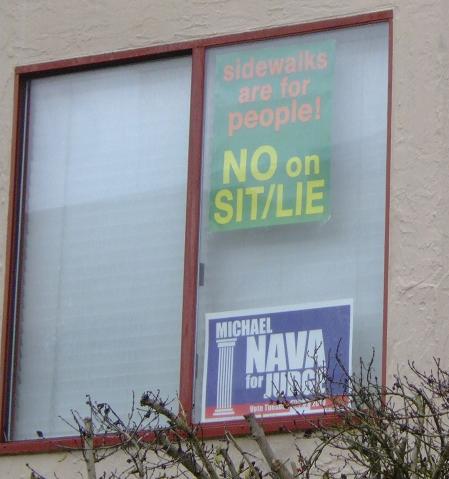In September, shortly after Elliot Kamin placed two political signs in the window of the condo he rents near Ocean Beach in the Richmond District, he received a letter from his property manager saying, “The signs you have posted in your window are a clear violation of the rules and regulations of the association. Please remove the signs immediately.” But now, with help of the American Civil Liberties Union, the signs are back up and Kamin is no longer being threatened with fines.
Ironically, one of the restored signs reflected Kamin’s concern for civil liberties, urging voters to reject Prop. L, the proposed law that would criminalize sitting or lying on San Francisco sidewalks.
“It is a problem that a lot of condo associations don’t seem to be aware that free speech rights don’t stop at the condo gates,” ACLU attorney Linda Lye told the Guardian. She suggests that some condo residents might be willingly complying with requests to remove signs because they are unaware of the laws.
California Civil Code Section 1353.6 states that homeowners associations “may not prohibit posting or displaying of non commercial signs, posters, flags, or banners on or in property that belongs to a condo owner.”
Kamin called the property management company, which works with the homeowners association that set the rules, and he was told they wouldn’t recognize that legal right, which they said was trumped by their rules for the properties. So Kamin called the ACLU and together, they filed a suit against the Citiscape Property Management Group and the Ocean Beach Homeowners Association.
“If you really want to piss me off, tell me that someone has more rights because they own property,” Kamin said.
OBHA finally relented and entered into a settlement last week that allowed Kamin to put up his two signs, which opposed Prop. L, the proposed sit-lie ordinance and supported judicial candidate Michael Nava. A call to OBHA wasn’t answered and a message left at CPMG hasn’t yet been returned.
“What good are rights if they’re only on paper?” Kamin said.
UPDATE: I just got a call back from Kevin Wyley, president of CPMG, who said the incident began when an individual board member sent Kamin the letter telling him to take down the sign. Wyley didn’t become involved with the situation for about another week: “I was not aware that the board member had told the tenant he could not put up the signs,” he told us. “The board member had mistakenly told the tenant he couldn’t put up a sign.”
Once he was able to reach all the board members to get their assent, Wyley said he contacted Kamin and the ACLU to let them know the signs could remain, although they continue to disagree with the ACLU over whether tenants may have more than nine square feet of total signage.
Wyley said hsaid it took a few more days to get some traveling board members to weigh in on the issue, but once they

